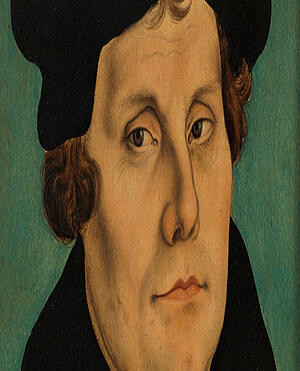Was Martin Luther a Revolutionary?

Was Martin Luther a Revolutionary? It is a question that has divided historians for centuries.
Some historians argue that when Martin Luther wrote his 95 Theses he was only building on the foundations of his predecessors. Others believe that his Luther’s ideas were innovative and caused the major upheaval that would become the Reformation.
It would be easy to believe that Luther’s 95 Theses triggered the Reformation. In the years after 1517, the Catholic Church was removed in England, Scotland, Sweden and northern Germany. The fact that this upheaval occurred in a relatively short time suggests that they were closely linked to the spread of Luther’s ideas.
Although it is unclear whether Luther initially anticipated such significant reform, by the time of his excommunication he certainly acting like a revolutionary. The Papa Bull Exsurge Dominie was issued in 1520. Luther immediately burned it, along with the book of Canon Law. He rebelled against the Church, despite the fact that this would likely result in his death.
However, many of the stories of Luther’s heroic and revolutionary life are likely myth. There is no evidence that he pinned up the 95 Theses, nor that he said “Here I stand. I cannot do otherwise. So help me God. Amen.” These two events were possibly manufactured to paint Luther in a dramatic and heroic light.
Also, Martin Luther was not the sole leader of this rebellion against the Church. Luther came from a long line of critics of the Church. Therefore, he expanded on the ideas of others, rather than forming his revolutionary philosophy himself. Without the help of key figures such as Frederick of Saxony and Philipp Melanchthon, the challenge to the Church would probably have failed.
Moreover, the fact that Luther gained the support of the north German princes suggests that he wasn’t attempting to completely overthrow the established order. For example, during the Peasants’ Revolt of 1525, Luther made plain his views on the place of the peasants in society, "This article (the 12 Articles of the Swabians) would make all men equal… and that is impossible." It is clear that Luther wasn’t trying to disrupt the status-quo or fight the inequalities in society.
Martin Luther was a revolutionary to the extent that his ideas challenged the established power of the Church. However, he did encourage a revolution against all forms of established order - his opposition was only directed towards the Church. Furthermore, he did not cause the Reformation. Instead he ignited the discontent and resentment already building up in society.
See also: Martin Luther
MLA Citation/Reference
"Was Martin Luther a Revolutionary?". HistoryLearning.com. 2026. Web.
